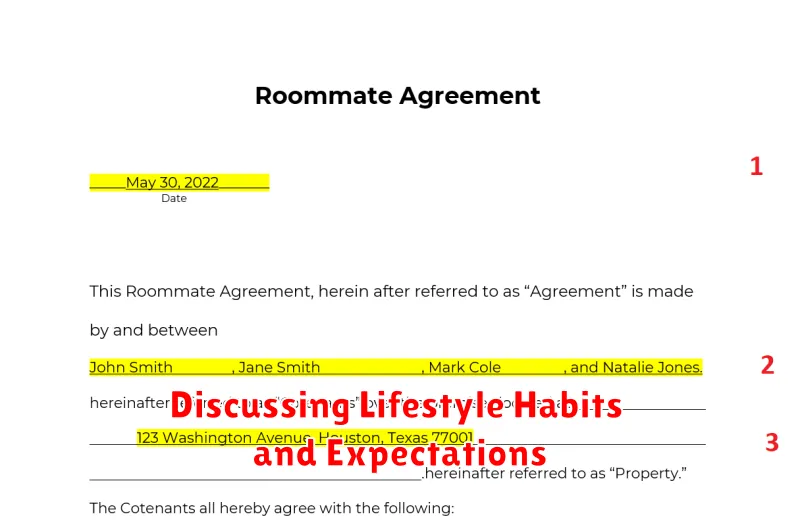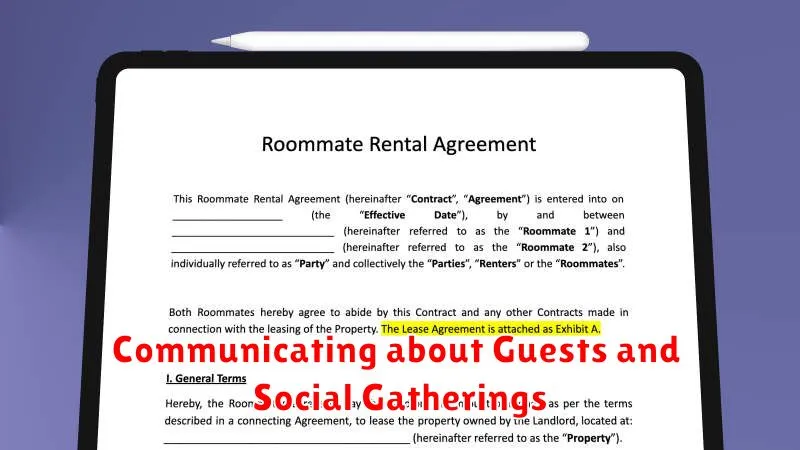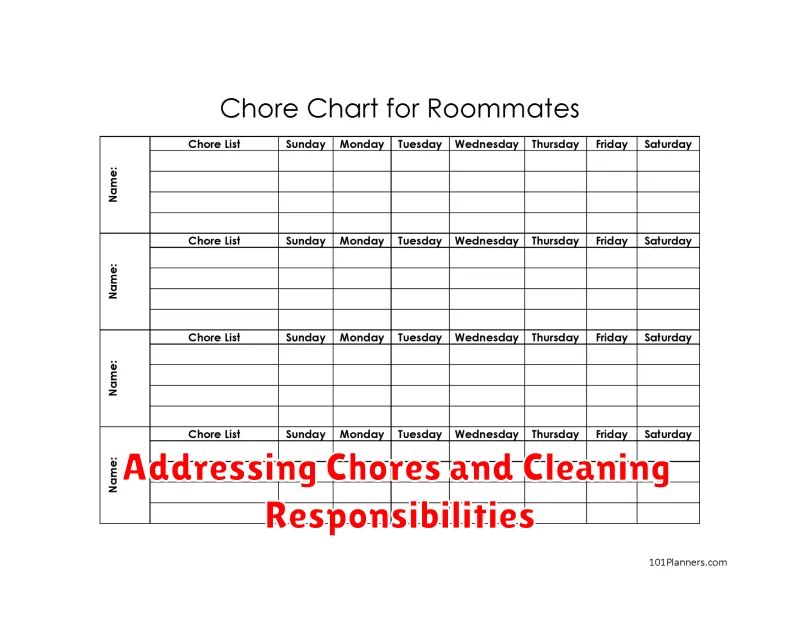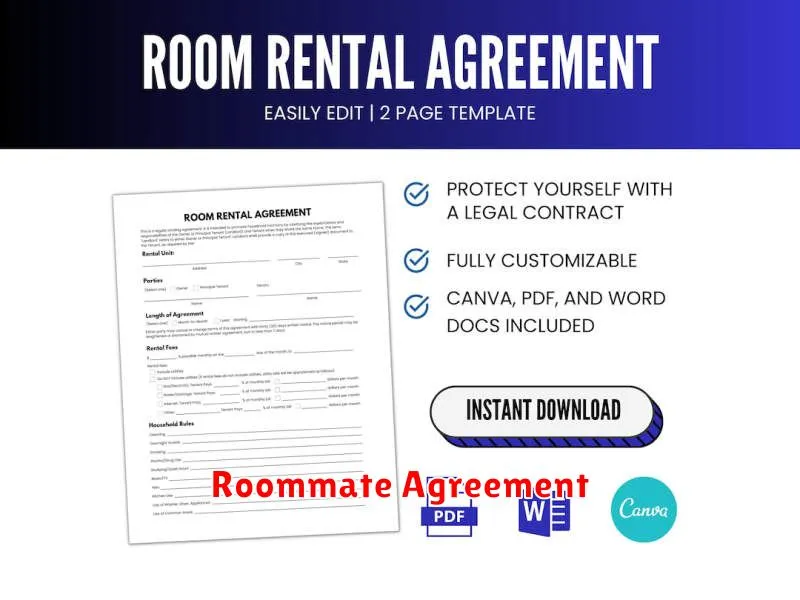Moving in with a roommate can be an exciting and cost-effective way to share a living space. However, finding the right roommate is crucial for a harmonious and enjoyable living experience. Before committing to a living arrangement, it’s essential to ask the right questions to ensure compatibility and avoid potential conflicts. This article provides a comprehensive list of questions to ask your potential roommate to gain valuable insights into their lifestyle, habits, and values.
Discussing Lifestyle Habits and Expectations

Before you move in with someone, it’s crucial to understand their lifestyle habits and expectations. This open communication can prevent potential conflicts and ensure a harmonious living environment. Some key areas to discuss include:
Cleaning and tidiness: How often do they clean? What are their standards for a clean living space? What are their expectations for shared spaces like the kitchen and bathroom?
Sleep schedule: Are they an early bird or a night owl? Do they need complete silence to sleep, or are they okay with some noise? Discussing these preferences can help you avoid disrupting each other’s sleep.
Guests: Are they okay with having guests over frequently? Do they have specific rules about guest behavior or overnight stays? Understanding these expectations can help prevent potential conflicts and maintain a comfortable environment.
Noise levels: How do they feel about music, TV volume, or late-night conversations? Are they okay with background noise, or do they prefer complete silence?
Food and cooking: Do they cook often? Are they comfortable with sharing food? Do they have dietary restrictions or preferences? Discussing these issues can ensure a comfortable and respectful arrangement.
Personal space: Do they need a lot of personal space? How do they feel about shared belongings? This discussion can prevent any misunderstandings about boundaries and respect.
Respectful communication is vital when discussing these sensitive topics. Be open to understanding their perspective, and be honest about your own expectations. By addressing these issues proactively, you can set the stage for a positive and comfortable roommate experience.
Establishing Shared Financial Responsibilities
Living with a roommate can be a great way to save money, but it’s important to establish clear financial responsibilities from the start. This can help prevent misunderstandings and conflicts down the line. Here are some important questions to ask your potential roommate:
How will we split the rent and utilities? This is a crucial conversation to have. Will you split everything evenly, or will one person pay more for a larger room? It’s essential to agree on a system that feels fair to both of you.
What is our budget for shared expenses? This includes things like groceries, cleaning supplies, and entertainment. Discussing your budget expectations upfront can help avoid financial strain.
How will we handle shared expenses like groceries and utilities? Will you split these costs evenly, or will you have a system where one person buys certain items and the other person pays them back? Consider what works best for your lifestyle.
What is your payment method preference? Will you use cash, Venmo, or another method? This will help ensure that payments are made on time and tracked properly.
What is your financial situation? It’s important to be transparent about your finances. This will help you understand each other’s financial limitations and make informed decisions.
By having open and honest conversations about financial responsibilities, you can set yourselves up for a successful and harmonious roommate experience.
Setting Boundaries and House Rules
Living with a roommate can be a great way to save money and make new friends, but it’s important to set clear boundaries and house rules from the start. This will help ensure that everyone is comfortable and respects each other’s space.
Some important topics to discuss with your potential roommate include:
- Guest Policy: How often can guests stay over? Are there any specific times when guests are not allowed?
- Quiet Hours: When is it acceptable to be quiet? This is especially important if one roommate is a night owl and the other is an early bird.
- Cleaning: What are the expectations for cleaning? Who is responsible for which chores?
- Food: Are you planning to share food? How will you handle groceries and leftovers?
- Pets: If either of you has pets, discuss how they will be integrated into the living situation.
- Smoking and Drinking: Are these allowed in the home? Are there any restrictions?
It’s also important to be clear about your own personal boundaries. What are you comfortable with and what are you not? Don’t be afraid to be upfront and honest with your potential roommate. The more open communication you have, the better chance you have of having a positive and enjoyable living experience.
Communicating about Guests and Social Gatherings

Living with a roommate means navigating shared spaces and creating a comfortable living environment for everyone. One important topic to discuss early on is how you both feel about guests and social gatherings. This can prevent potential conflicts and ensure you’re on the same page.
It’s important to understand your potential roommate’s social habits. Ask questions like:
- How often do you have friends over?
- What are your preferences for having guests? (e.g., specific days, times, etc.)
- How do you feel about overnight guests?
- Do you have any specific expectations about noise levels during gatherings?
- What are your thoughts on using shared spaces for social gatherings? (e.g., the living room, kitchen)
- Are there any types of gatherings you’d prefer not to have in the apartment?
By openly discussing these topics, you can establish clear expectations and create a comfortable and respectful living environment for both of you.
Addressing Chores and Cleaning Responsibilities

Living with roommates can be a great way to save money and build friendships, but it’s essential to establish clear expectations about chores and cleaning responsibilities from the start. To prevent potential conflicts, discuss these questions with your potential roommate:
- What are your cleaning habits? Do you prefer a tidy or a more relaxed living environment?
- How often do you think the common areas should be cleaned? Establish a cleaning schedule that works for both of you.
- What are your expectations for shared spaces like the kitchen and bathroom? Who will be responsible for what?
- Are you comfortable with a chore chart or a rotating system? This can help ensure fairness and prevent resentment.
- What happens if someone consistently doesn’t do their share? Agree on a strategy to address this.
- Are there any specific cleaning products or methods you prefer? This helps avoid surprises and ensure everyone is comfortable.
By discussing these issues openly and honestly, you can set the foundation for a clean and harmonious living environment with your roommate.
Sharing Utilities and Other Expenses
Living with a roommate can be a great way to save money on rent and other living expenses. However, it’s important to discuss how you’ll be sharing utilities and other expenses before you move in. This can help to avoid disagreements and ensure that everyone is on the same page.
Here are some questions to ask your potential roommate about sharing utilities and other expenses:
- What are the estimated monthly costs of utilities, such as electricity, gas, water, and internet?
- How do you propose to split these costs?
- Are there any other expenses that we’ll need to share, such as groceries or cleaning supplies?
- How will we track our individual spending?
- What will we do if one person consistently uses more of a particular utility than the other?
- Is there a budget for the apartment that we can agree on?
By discussing these questions with your potential roommate, you can ensure that you’re both on the same page about sharing utilities and other expenses. This will help to prevent disagreements and make your living situation more harmonious.
Handling Conflicts and Disagreements Respectfully
Living with someone can be a wonderful experience, but it’s inevitable that conflicts will arise from time to time. It’s important to be prepared for these situations and to have a plan for how you’ll handle them respectfully. Ask your potential roommate how they typically approach disagreements. Do they prefer to talk things out, or do they need some time to cool down before discussing things? What are their boundaries when it comes to personal space and belongings? Understanding their communication style and conflict resolution preferences will help you navigate potential disagreements and maintain a healthy living arrangement.
It’s also important to discuss your expectations for respecting each other’s space and belongings. Are you comfortable with a certain level of messiness, or do you prefer a more organized environment? How do you feel about guests staying over? Having open and honest conversations about these topics will help set the foundation for a respectful and harmonious living situation.
Determining a Roommate Agreement
Living with a roommate can be a great way to save money and make new friends, but it’s crucial to set clear expectations and boundaries from the start. A roommate agreement is an essential document that outlines both parties’ responsibilities, rights, and expectations. It can help prevent misunderstandings and disagreements down the line.
When determining a roommate agreement, consider addressing crucial aspects such as:
- Rent and Bills: How will rent and utilities be split? Will you have a fixed amount or a percentage split based on income?
- Cleaning and Chores: Who is responsible for what chores and how often? Can you create a shared chore schedule?
- Guests and Overnight Visitors: Are there any restrictions on guests or overnight visitors? How much notice is required?
- Noise Levels: What are acceptable noise levels at different times of day? Can you designate quiet hours?
- Food and Supplies: Will you share food and groceries? Will you establish a system for replacing items?
- Pets: If either of you has a pet, discuss rules regarding pets, such as allergies, breeds, and access to common areas.
- Parking: If parking is limited, how will you address parking arrangements?
- Privacy: Discuss expectations around personal space and belongings, such as shared spaces and the use of each other’s belongings.
- Conflict Resolution: How will you handle disagreements or conflicts that may arise?
- Lease and Legal Obligations: Understand your responsibilities as tenants under the lease agreement.
Remember, a roommate agreement is a living document. It’s important to discuss and revisit it periodically to ensure it remains relevant and addresses any changing needs or circumstances.
Questions about Pets or Allergies
Living with a roommate can be a great way to save money and make new friends, but it’s important to make sure you’re compatible before signing any leases. One important topic to discuss is pets and allergies. Before you move in together, you should ask your potential roommate about their pets and any allergies they have. This will help you avoid any unpleasant surprises down the road.
Here are a few questions to ask your potential roommate about pets and allergies:
- Do you have any pets?
- If so, what kind of pets do you have? Are they hypoallergenic? (e.g. a Poodle or a Sphynx Cat)
- Are you allergic to any pets?
- Are there any pets you are not comfortable living with? (e.g., snakes, spiders)
- Are you open to having pets in the house in the future?
- What are your thoughts on having pets in the house?
- Do you have any allergies?
- What is your preferred cleaning schedule?
- Are you willing to compromise on pet-related issues?
By asking these questions, you can get a better sense of your potential roommate’s preferences and avoid any potential conflicts. It’s important to be honest about your own preferences as well. If you have allergies, make sure to let your potential roommate know. You should also be open to compromise and work together to create a living situation that works for everyone.
Emergency Contact Information and Procedures
It’s crucial to have access to each other’s emergency contact information in case of an emergency. This includes the names, phone numbers, and addresses of at least two people who can be contacted in case of an emergency. It’s also a good idea to discuss what procedures you’ll follow in case of an emergency. For example, who will call 911? Who will be responsible for contacting your families? Discussing this beforehand will help you navigate any difficult situation.

